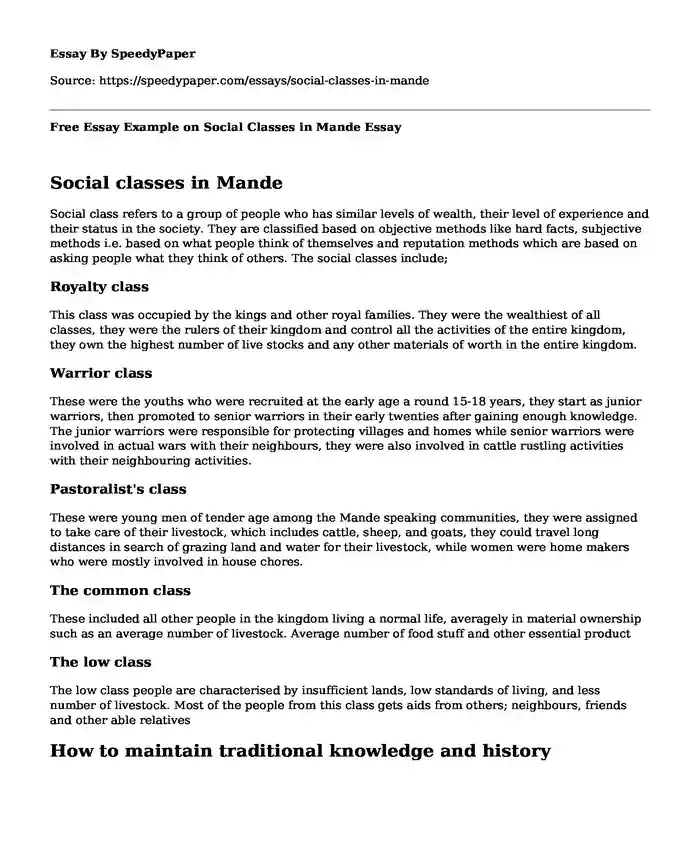Social classes in Mande
Social class refers to a group of people who has similar levels of wealth, their level of experience and their status in the society. They are classified based on objective methods like hard facts, subjective methods i.e. based on what people think of themselves and reputation methods which are based on asking people what they think of others. The social classes include;
Royalty class
This class was occupied by the kings and other royal families. They were the wealthiest of all classes, they were the rulers of their kingdom and control all the activities of the entire kingdom, they own the highest number of live stocks and any other materials of worth in the entire kingdom.
Warrior class
These were the youths who were recruited at the early age a round 15-18 years, they start as junior warriors, then promoted to senior warriors in their early twenties after gaining enough knowledge. The junior warriors were responsible for protecting villages and homes while senior warriors were involved in actual wars with their neighbours, they were also involved in cattle rustling activities with their neighbouring activities.
Pastoralist's class
These were young men of tender age among the Mande speaking communities, they were assigned to take care of their livestock, which includes cattle, sheep, and goats, they could travel long distances in search of grazing land and water for their livestock, while women were home makers who were mostly involved in house chores.
The common class
These included all other people in the kingdom living a normal life, averagely in material ownership such as an average number of livestock. Average number of food stuff and other essential product
The low class
The low class people are characterised by insufficient lands, low standards of living, and less number of livestock. Most of the people from this class gets aids from others; neighbours, friends and other able relatives
How to maintain traditional knowledge and history
Encouraging the use of art
Such non-literate communities should be encouraged to use the art as the method of keeping their records, such as painting and drawing pictures. They are also encouraged to use the craft methods, these will improve their memories on their old culture.
Encourage the use of traditional tools
The use of traditional systems and tools usually keeps the mind of the people fresh from the original, even if these people were not there at the time of their inventory. The continuous use of such old tools enables them to be past from generations to generations
Encourage the use of written methods
Written documents tend to last longer and can be past to other several generations, the old written documents contains information mostly from the past hence several generations later can be able to access the information of the past. This method should be encouraged as much as possible.
Significance of viewing the film
From the film I noted that it is significant for someone to do whatever he or she is doing whole heartedly, the reward may be seen later but forever it will remain significant in your community's history.
From the film I realised that one should not underrate his own culture and community however local it may look, something great can come out of that underrated community that may capture the whole world's attention.
I learned about the complex emotions that his friends and family had during his return from the musical world, he has explored the world and also made the world see his talent also expose the culture of his people to the whole world, this taught me how important it is to represent your people well in the world platform
Bibliography
Abraham, Arthur (1978). Mande Government & politics Under colonial Rule; A history of the study of political change in Sierra Leone, 1890-1937. Freetown Sierra Leone University Press
Boone, Sylvia Ardy (1986). Randian from the waters. Ideas of the Feminine Beauty in Mende Art Nev Haven CT Yale University Press.
References
Tamari, Tal (1991). "The Development of Caste Systems in West Africa". The Journal of African History. Cambridge University Press. 32 (02): 221-250.
Susan McIntosh (2001). Christopher R. DeCorse, ed. West Africa During the Atlantic Slave Trade: Archaeological Perspectives. Bloomsbury Academic. pp. 17-18.
Tal Tamari (2005), Kingship and Caste in Africa: History, Diffusion and Evolution, Editor: Declan Quigley in The Character of Kingship, Berg, pages 141-169
Teshale Tibebu (1995). The Making of Modern Ethiopia: 1896-1974. The Red Sea Press. pp. 67-70.
Cite this page
Free Essay Example on Social Classes in Mande. (2022, Apr 05). Retrieved from https://speedypaper.net/essays/social-classes-in-mande
Request Removal
If you are the original author of this essay and no longer wish to have it published on the SpeedyPaper website, please click below to request its removal:
- Citation and Notification of Penalty - Workplace Safety Essay Sample
- Medical Coding and Billing Essay Example
- Paper Example on off the Rails: The Spring Valley Detention Center
- Enlightenment and the French Revolution, Free Essay in History
- Paper Example. Safe Harbor Agreement
- Free Essay Sample - Cloud Storage
- Essay Sample on Starbucks' Organizational Setting
Popular categories





